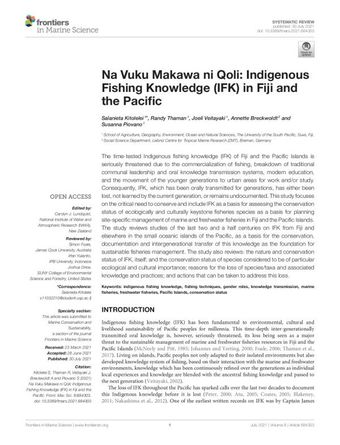Teach Indigenous knowledge alongside Science
- Description:
- Cnflict has grown around Indigenous knowledge in education policy. There has been growing acceptance of the value of Indigenous knowledge for promoting ecological resilience, transformational approaches in stewardship, and cultural renewal within global fora such as the Intergovernmental Panel on Climate Change. However, despite increasing acceptance at a strategic high level in science-informed policy, there is often a lack of wider acceptance, application, and policy protections of Indigenous knowledge transmission in more local settings, including opposition by some scientists. We argue that Indigenous knowledge can complement and enhance science teachings, benefitting students and society in a time of considerable global challenges. We do not argue that Indigenous knowledge should usurp the role of, or be called, science. But to step from “not science” to “therefore not as (or at all) valuable and worthy of learning” is a non sequitur, based on personal values and not a scientifically defensible position.
- Display date:
- 2024
- Location:
- Pacific Region
- Collections:
- Secretariat of the Pacific Regional Environment Programme (SPREP)
- Publisher:
- Science Org
- Content partner:
- Secretariat of the Pacific Regional Environment Programme (SPREP)
- Availability:
- Not specified
-
Copyright status: All rights reservedFind out more about what you are able to do with this itemThis item is all rights reserved, with means you'll have to get permission from Secretariat of the Pacific Regional Environment Programme (SPREP) before using it. For more information, please see our use and reuse page.What can I do with this item?Non-infringing useNZ copyright law does not prevent every use of a copyright work, and this item may be hosted by an international institute or organisation. You should consider what you can and cannot do with a copyright work.No sharingYou may not copy and/or share this item with others without further permission. This includes posting it on your blog, using it in a presentation, or any other public use.No modifyingYou are not allowed to adapt or remix this item into any other works.No commercial useYou may not use this item commercially.
Related items
Welcome and warm Pasifik greetings
The information on this site has been gathered from our content partners.
The names, terms, and labels that we present on the site may contain images or voices of deceased persons and may also reflect the bias, norms, and perspective of the period of time in which they were created. We accept that these may not be appropriate today.
If you have any concerns or questions about an item, please contact us.
